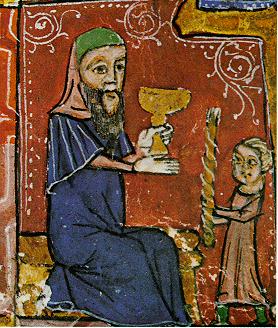Havdalah
Havdalah (Hebrew: הַבְדָּלָה, "separation") is a Jewish religious ceremony that marks the symbolic end of Shabbat and ushers in the new week. The ritual involves the lighting of a special Havdalah candle, the blessing of a cup of wine, and the smelling of sweet spices. Havdalah is recited after nightfall on Saturday evening, when three stars are visible in the sky, signifying the end of the Sabbath.
Etymology[edit | edit source]
The word "Havdalah" means "separation" or "distinction" in Hebrew. It refers to the act of distinguishing between the sacredness of Shabbat and the ordinariness of the weekdays.
Components of Havdalah[edit | edit source]
Havdalah consists of four blessings:
- Over the wine (Kiddush), which symbolizes joy and sanctification.
- Over fragrant spices (Besamim), to comfort the soul that is said to lose an extra level of spiritual sensitivity with the departure of Shabbat.
- Over the flame of a candle, which represents the first act of creation by humans after Shabbat, acknowledging the ability to create fire.
- A final blessing that acknowledges the separation between the sacred and the mundane, between Shabbat and the working week.
Havdalah Candle[edit | edit source]
The Havdalah candle must have multiple wicks, traditionally at least two, braided or twisted together, symbolizing the intertwining of the sacred and the secular aspects of life. The use of a multi-wicked candle distinguishes the Havdalah light from the single flame of a Shabbat candle.
Spices (Besamim)[edit | edit source]
The spices used in Havdalah are typically contained in a decorative box or holder. Common spices include cloves, cinnamon, and myrtle, chosen for their strong and pleasant fragrance. The smelling of spices is intended to revive the soul saddened by the departure of Shabbat.
Wine[edit | edit source]
Wine, a symbol of joy and sanctification in many Jewish rituals, is used to bless the transition from Shabbat to the weekdays. The person leading Havdalah recites the blessings while holding a full cup of wine, and at the conclusion of the ceremony, drinks from the cup.
Significance[edit | edit source]
Havdalah serves as a moment of reflection on the unique sanctity of Shabbat and a ritual preparation for the week ahead. It emphasizes the Jewish values of sanctity, joy, and the distinction between different times and states of being.
Customs and Traditions[edit | edit source]
While the core elements of Havdalah are consistent, various Jewish communities may incorporate additional customs, prayers, or songs. For example, some Sephardic communities have the custom of pouring the wine over the hands or using it for a small blessing for prosperity.
In Jewish Law and Tradition[edit | edit source]
The obligation to perform Havdalah is derived from the Torah, where it is implied from the commandment to "remember" (Zachor) and "observe" (Shamor) the Shabbat. The Talmud elaborates on the practice and its components, emphasizing its importance in Jewish life and law.
Conclusion[edit | edit source]
Havdalah is a poignant ceremony that beautifully encapsulates the transition from the holiness of Shabbat to the regularity of the week. It serves as a weekly reminder of the Jewish people's enduring commitment to sanctity, joy, and the cyclical nature of time.
Search WikiMD
Ad.Tired of being Overweight? Try W8MD's physician weight loss program.
Semaglutide (Ozempic / Wegovy and Tirzepatide (Mounjaro / Zepbound) available.
Advertise on WikiMD
|
WikiMD's Wellness Encyclopedia |
| Let Food Be Thy Medicine Medicine Thy Food - Hippocrates |
Translate this page: - East Asian
中文,
日本,
한국어,
South Asian
हिन्दी,
தமிழ்,
తెలుగు,
Urdu,
ಕನ್ನಡ,
Southeast Asian
Indonesian,
Vietnamese,
Thai,
မြန်မာဘာသာ,
বাংলা
European
español,
Deutsch,
français,
Greek,
português do Brasil,
polski,
română,
русский,
Nederlands,
norsk,
svenska,
suomi,
Italian
Middle Eastern & African
عربى,
Turkish,
Persian,
Hebrew,
Afrikaans,
isiZulu,
Kiswahili,
Other
Bulgarian,
Hungarian,
Czech,
Swedish,
മലയാളം,
मराठी,
ਪੰਜਾਬੀ,
ગુજરાતી,
Portuguese,
Ukrainian
Medical Disclaimer: WikiMD is not a substitute for professional medical advice. The information on WikiMD is provided as an information resource only, may be incorrect, outdated or misleading, and is not to be used or relied on for any diagnostic or treatment purposes. Please consult your health care provider before making any healthcare decisions or for guidance about a specific medical condition. WikiMD expressly disclaims responsibility, and shall have no liability, for any damages, loss, injury, or liability whatsoever suffered as a result of your reliance on the information contained in this site. By visiting this site you agree to the foregoing terms and conditions, which may from time to time be changed or supplemented by WikiMD. If you do not agree to the foregoing terms and conditions, you should not enter or use this site. See full disclaimer.
Credits:Most images are courtesy of Wikimedia commons, and templates, categories Wikipedia, licensed under CC BY SA or similar.
Contributors: Prab R. Tumpati, MD



